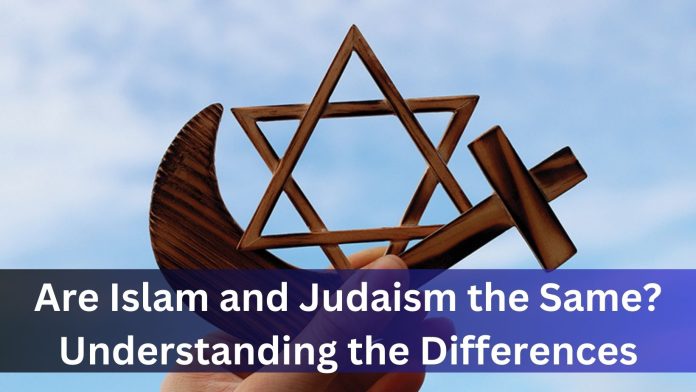Islam and Judaism are two of the world’s major monotheistic religions, both tracing their origins to the patriarch Abraham. Despite these shared roots, the two religions differ significantly in their beliefs, practices, and worldviews. This article explores the Islamic perspective on Judaism, highlighting the key differences between the two faiths while addressing the common question: “Is Islam the same as Judaism?”
Shared Origins but Divergent Paths
Islam and Judaism share a common heritage through Abraham, who is regarded as a prophet in both religions. However, the paths of these two faiths diverged significantly with the emergence of Islam in the 7th century CE. While Judaism remained centered on the covenant between God and the descendants of Abraham through Isaac, Islam emerged as a universal religion, calling all of humanity to submit to the will of Allah.
Support Our Work
If you like the Islamic articles on this website, please help us by supporting us with a donation starting from $1, so that we can continue to write more Islamic articles.
In Islam, Abraham (Ibrahim) is seen as a “Muslim” in the sense that he was one who submitted to God’s will, which is the essence of Islam. The Qur’an states: “Ibrahim was neither a Jew nor a Christian, but he was one inclining toward truth, a Muslim [submitting to Allah]. And he was not of the polytheists” (Qur’an 3:67). This verse highlights the Islamic view that true submission to God (Islam) predates Judaism and Christianity and that Islam is a continuation and fulfillment of the monotheistic tradition established by Abraham.
Key Differences in Belief and Practice
One of the most fundamental differences between Islam and Judaism lies in their understanding of God and revelation. While both religions are strictly monotheistic, Islam emphasizes the oneness of God (Tawhid) to an absolute degree, rejecting any anthropomorphic attributes or intermediaries. In contrast, while Judaism also upholds the oneness of God, it incorporates a more complex understanding of God’s nature, particularly in the context of the covenant with the Jewish people.
Another significant difference is the role of prophets and scripture. In Judaism, the Torah (the first five books of the Hebrew Bible) is the central religious text, believed to be the divine revelation given to Moses (Musa). In Islam, however, the Qur’an is seen as the final and complete revelation from God, superseding all previous scriptures, including the Torah. Muslims believe that while the Torah was originally a true revelation, it has been altered over time, and therefore the Qur’an was revealed to correct these alterations and provide guidance for all humanity.
Support Our Work
If you like the Islamic articles on this website, please help us by supporting us with a donation starting from $1, so that we can continue to write more Islamic articles.
Islam also recognizes a broader spectrum of prophets, including those who are central to Judaism, such as Moses and David (Dawud), but also including figures not recognized in Judaism, such as Jesus (Isa) and Muhammad. Muhammad is considered the “Seal of the Prophets,” meaning that he is the final prophet sent by God, and no further prophets will come after him.
The Concept of Chosenness and Universalism
Judaism traditionally teaches that the Jewish people are God’s chosen people, selected to fulfill a specific covenant with God. This concept of chosenness is central to Jewish identity and religious practice. In contrast, Islam rejects the idea of a chosen race or nation. Instead, it teaches that all human beings are equal before God, and what matters is an individual’s faith and deeds rather than their ethnicity or lineage.
The Qur’an emphasizes the universality of its message, stating that Muhammad was sent as a mercy to all the worlds (Qur’an 21:107). Islam calls on all people, regardless of their background, to submit to the one true God and follow the guidance of the Qur’an. This universal approach contrasts with Judaism’s more particularistic focus on the Jewish people and their relationship with God.
Support Our Work
If you like the Islamic articles on this website, please help us by supporting us with a donation starting from $1, so that we can continue to write more Islamic articles.
Islamic Critique of Judaism
Islamic teachings contain a critical view of Judaism, particularly concerning the perceived alterations and misinterpretations of the original divine message. The Qur’an often addresses the “People of the Book” (Ahl al-Kitab), a term that includes Jews and Christians, calling them to recognize the truth of Islam and to follow the final revelation given to Muhammad.
One of the critiques found in the Qur’an is the accusation that some Jews have distorted their scriptures and turned away from God’s commandments. The Qur’an says, “So woe to those who write the ‘scripture’ with their own hands, then say, ‘This is from Allah,’ in order to exchange it for a small price. Woe to them for what their hands have written and woe to them for what they earn” (Qur’an 2:79). This verse reflects the Islamic belief that the Torah, as it exists today, is not entirely in its original form and that the Qur’an is necessary to correct these distortions.
Additionally, Islam teaches that the Jewish rejection of Jesus as the Messiah and Muhammad as the final prophet represents a significant deviation from the true path of monotheism. Muslims believe that by refusing to accept these prophets, Jews have failed to fulfill the true purpose of their faith, which is to submit to God’s will as revealed through all of His prophets.
Help us continue to create useful articles like the ones on this page
Every donation you make will go a long way in enabling us to continue writing on this page. Even a 1 dollar donation will help.




